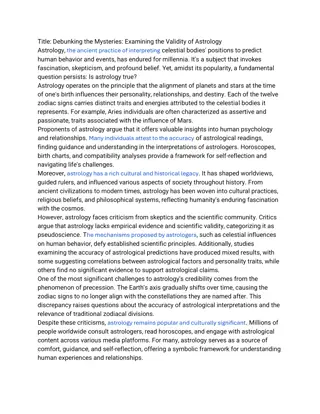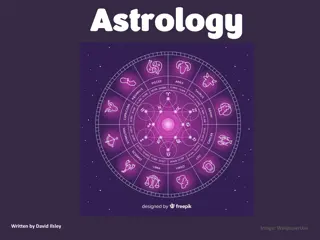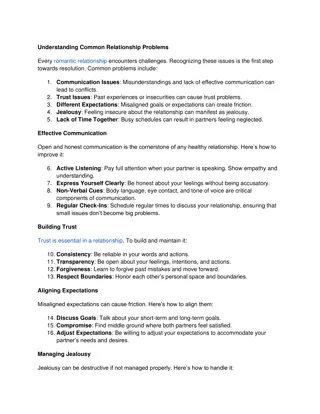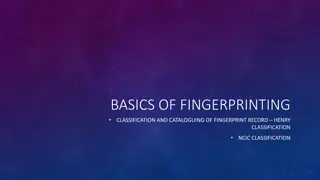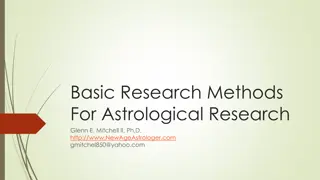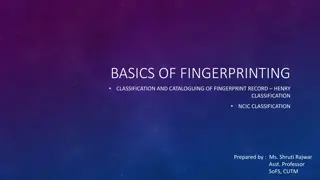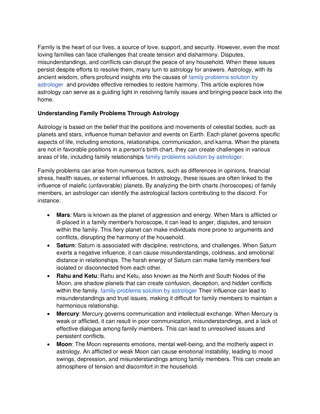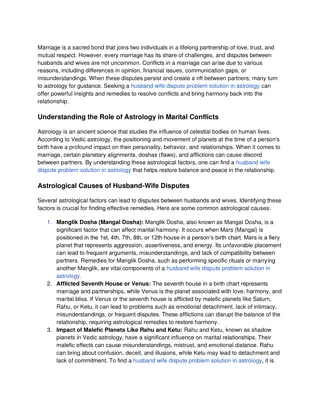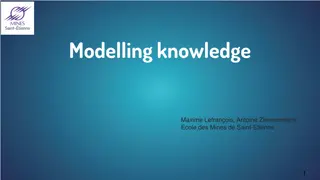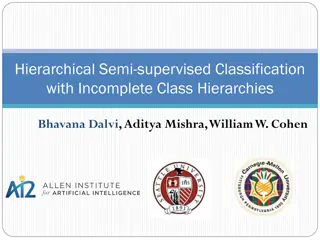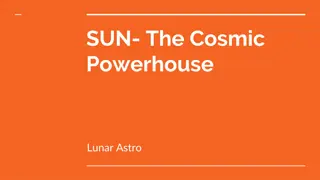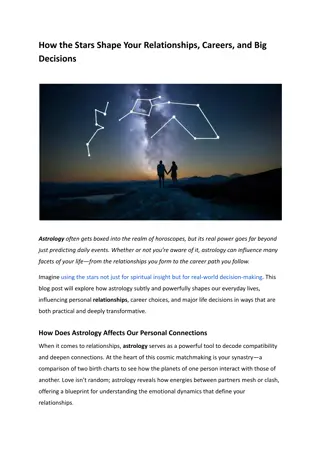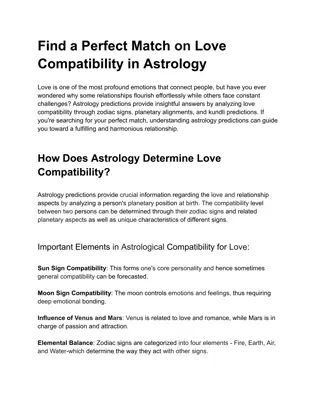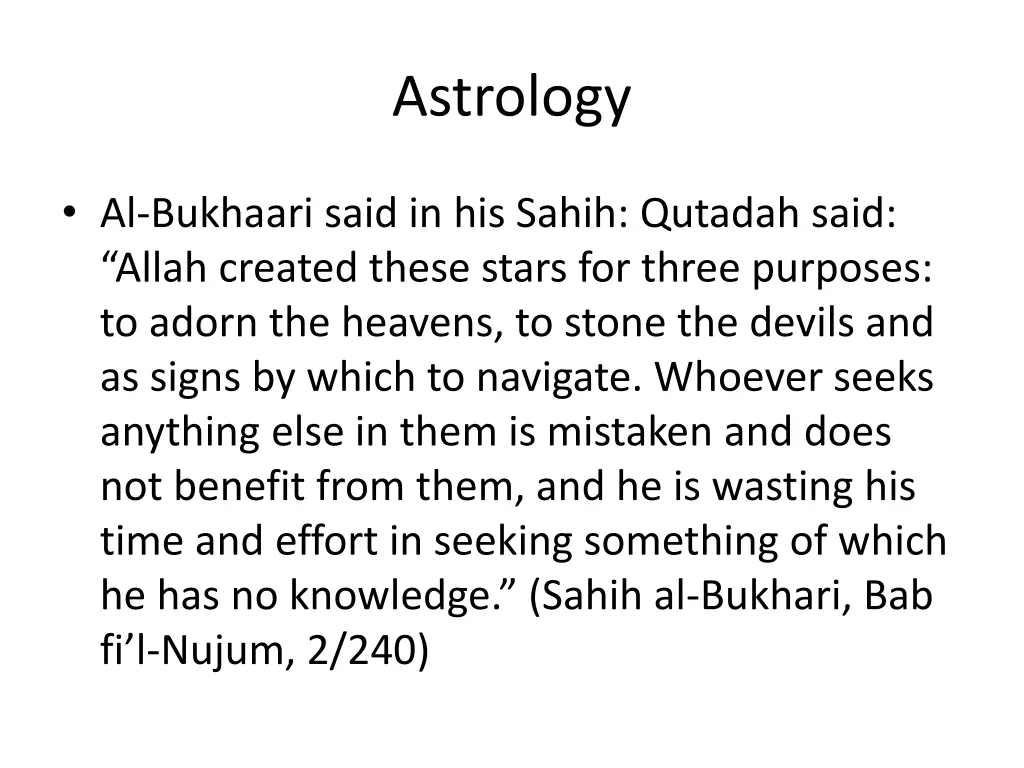
Understanding the Study of Stars in Islam
Discover the Islamic perspective on studying stars, where astrology is considered shirk, and astronomy is valued for religious purposes like determining the qiblah direction. Learn why attributing events to stars is seen as disbelief and how to differentiate between permissible and forbidden practices in star observation.
Download Presentation

Please find below an Image/Link to download the presentation.
The content on the website is provided AS IS for your information and personal use only. It may not be sold, licensed, or shared on other websites without obtaining consent from the author. If you encounter any issues during the download, it is possible that the publisher has removed the file from their server.
You are allowed to download the files provided on this website for personal or commercial use, subject to the condition that they are used lawfully. All files are the property of their respective owners.
The content on the website is provided AS IS for your information and personal use only. It may not be sold, licensed, or shared on other websites without obtaining consent from the author.
E N D
Presentation Transcript
Astrology Al-Bukhaari said in his Sahih: Qutadah said: Allah created these stars for three purposes: to adorn the heavens, to stone the devils and as signs by which to navigate. Whoever seeks anything else in them is mistaken and does not benefit from them, and he is wasting his time and effort in seeking something of which he has no knowledge. (Sahih al-Bukhari, Bab fi l-Nujum, 2/240) 1
The study of the stars is divided into two kinds: 1- Study of the influence of the stars (astrology) 2- Study of the positions and movements of the stars (astronomy) Study of the influence of the stars (astrology) is divided into three categories: 1 The belief that these stars have a real influence in the sense that they create events and evil. This is shirk. 2
2 Making this a reason to claim to have knowledge of the unseen, so from the movements and changes in the stars he deduces that such and such will happen because such and such has happened to such and such a star. For example, he may say that one person s life will be miserable because he was born under this star, and that another person s life will be happy because he was born under that star. This person is taking knowledge of the stars as a means to claim that he has knowledge of the unseen, and claiming to have knowledge of the unseen is kufr (disbelief): Say: None in the heavens and the earth knows the Ghayb (Unseen) except Allah [al-Naml 29:65] 3
3 If he believes that the stars are the cause of good or bad things happening, this is shirk. The basic principle is that whoever believes that one thing is the cause of another when Allah has not made it so, is overstepping the mark and not acknowledging Allah as He should be acknowledged, because the One Who makes things happen is Allah alone. 4
Study of the positions and movements of the stars (astronomy) is divided into two categories: 1 If their movements are used to define things that serve a religious purpose, this is something that is necessary. If that helps in the case of religious obligations, then learning it is obligatory, such as using the stars to determine the direction of the qiblah (direction of Makkah). 5
2 If their movements are used to define things that serve a worldly purpose, there is nothing wrong with that. This is of two types: (a) Using the stars to work out directions, such as knowing that the pole lies to the north, and that the Pole Star, which is close to it, revolves around the North Pole. This is permissible. Allah says (interpretation of the meaning): And landmarks (signposts, during the day) and by the stars (during the night), they (mankind) guide themselves [al-Nahl 16:16] 6
(b) Using the stars to work out the seasons, through learning the phases of the moon. Some of the salaf regarded this as makruh while others permitted it. The correct view is that it is permissible and there is nothing makruh in it, because there is no shirk involved in it, unless one learns it in order to attribute rainfall or cold weather to it, and says that this is what is causing that. That is a kind of shirk. But simply knowing the time of year from it, whether it is spring or autumn or winter, there is nothing wrong with that. Ref: Al-Qawl al-Mufeed by Shaykh Muhammad ibn Uthaymeen (may Allah have mercy on him), 2/102. 7
Ibn `Uthaymeen, said: Astrology is a kind of sorcery and fortune-telling. It is forbidden because it is based on illusions, not on concrete facts. There is no relation between the movements of celestial bodies and what takes place on the Earth. 8
During the Prophets lifetime, it happened that the sun eclipsed on the same day when the Prophet s son Ibrahim died. The people then thought that it had eclipsed because of the Prophet s son s death. On knowing this, the Prophet (peace and blessings be upon him) led them in the Eclipse Prayer and then delivered them a speech saying: The sun and moon are but signs of Allah; they do not eclipse because so-and-so died or was born. 9
The above hadith indicates that the Prophet (s.a.w) denied all relation between the movements of the heavenly bodies and events on the Earth. Ibn Abbas (may Allah be pleased with him and his father) reported that Allah s Messenger (s.a.w) said: He who has acquired some knowledge of astrology has acquired some knowledge of sorcery; the more he acquires of the former the more he acquires of the latter. (Reported by Ahmad, Abu Dawud, and Ibn Majah) 10
Commenting on the above hadith, al- Shawkani said that the Prophet (s.a.w) compared between astrology and sorcery because sorcery was known to be forbidden; and so, he who would get some knowledge of astrology would do something forbidden and would be sinful. 11
To sum up, astrology is based on lies and deceit; it has no scientific basis. The astrologists usage of computers to convince people that what they do is technological and scientific is nothing but deceit. There is no scientific proof that there is a relationship between the appearance of a star in a specific time and the character and behavior of someone born at that time. 12


